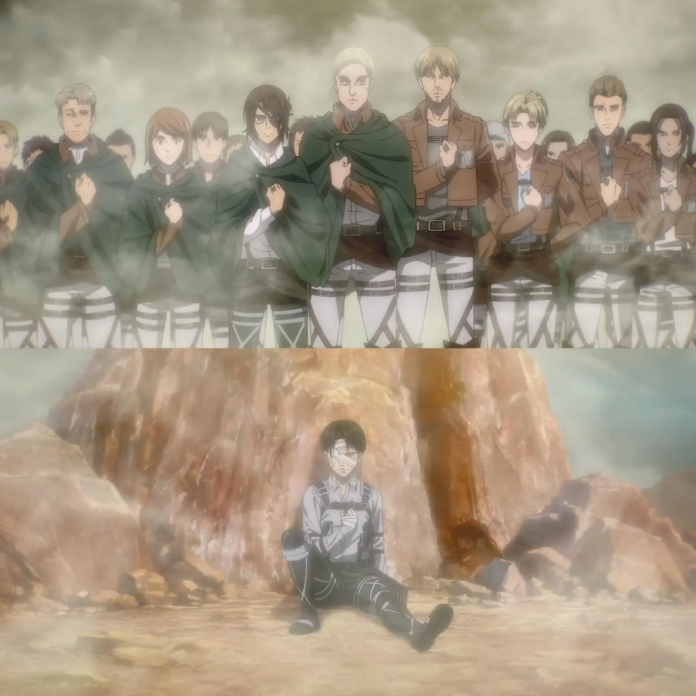© Hajime Isayama/Kodansha/MAPPA
Admit it, you’ve done the salute at least once. We’ve seen the salutes, cosplay, and everything in between from all kinds of celebrities solidifying Attack On Titan’s impact over the past ten years. With mesmerizing storytelling and mind-blowing action sequences, it’s no surprise Attack on Titan would be a monstrous success on the late-night action block, thanks in large part to the Adult Swim block promoting it to new levels (which caught the attention of myself and many others). Thankfully, Toonami became the place to premiere English dubbed episodes, which helped the block’s success and longevity, making me believe it is the most crucial series Toonami has ever aired on Adult Swim. Attack on Titan’s massive popularity paved the way for other fan-favorite series to air, like Hunter x Hunter, One-Punch Man, and My Hero Academia, paving the way for Toonami fans to realize that if it’s popular, you should expect it on the greatest action cartoon block on the planet. Attack on Titan has cemented its legacy as the most influential series to air on Toonami and how its success impacted future lineups to be the must-see events they are today.
Attack on Titan made Toonami its home on May 2, 2014, which was perfectly slotted when looking at the lineup at the time, with edgier series’ like Black Lagoon and Hellsing Ultimate also on the block. Immediately, fans were hooked on the zombie apocalypse series, with an exciting twist to the beloved genre. What made Attack on Titan an instant hit is that it has the perfect balance between action and storytelling that feels on par with some of the elite series for anime. Unraveling mysteries and unpredictable revelations while giving unforgettable action sequences kept fans’ attention, securing Attack on Titan as a must-see for newbies and seasoned anime enthusiasts. Even when the adversaries shifted from Titan to other humans, fans didn’t lose interest because of the captivating chain of events that fed the curiosity to see how things would turn out, creating a story that has a long-lasting presence and excitement that is seldom seen (which was evident due to how fans were rabid during the wait for the following seasons).
Much like Dragon Ball Z and Gundam Wing were broadcast at the right time, Attack on Titan is in a similar standing for Adult Swim’s Toonami run. Its massive popularity and success opened the door for the block to acquire other massive hits (before streaming services started to hold off) and became a home for Simuldubbing. Space Dandy will be viewed as the starting point for that concept, being a property of FUNimation, which allowed the two sides to continue to work together and would help bring the much-anticipated second season to Toonami when it was finally made. This moment was a monumental win for the block due to how long Toonami fans had to wait for a new series or the following season to be television-ready. Instead of a possible year or so, the wait turned to a few weeks! Shows like Attack on Titan could benefit from these shortened periods and be seen by many more people sooner allowing a fanbase to grow significantly by the day.
© HajimeIsayama/Kodansha/MAPPA
Sadly, Attack on Titan did lose a bit of shine, which was only enhanced due to how the final couple of seasons were broken up, giving a feel of the series being milked. Almost like they had to make up for the lost time between seasons one and two, fans became frustrated with the final season being broken up into four parts. Fans became impatient, feeling misled, and wanted the series to end like other seasons have had. And considering how the anime landscape changed with streaming and how unlikely Crunchyroll looked to work with the block on other series, many grew anxious about Toonami being able to broadcast the final parts of Attack on Titan. Thankfully Attack on Titan could finish its entire Toonami run, but by then, many fans had lost interest in Eren Yaeger’s twisted journey. Something others will mention when talking about its legacy (losing interest).
It’s easy to downplay the impact Attack on Titan has had due to how long fans have had to wait for seasons, but there’s still a ton to look at when discussing how popular it is. Attack on Titan started as a post-apocalyptic series about preserving what was left of humanity, but the story’s progression revealed humans were a more significant threat than any Titan, creating a beautiful tale of how the worst enemy you have might be the person next to you. What was made clear throughout the series is humanity’s doomed fate of a never-ending cycle of war where each side believes it’s doing what is best for its people, making both sides sympathetic (to a certain extent) as Eldians and Marleyans had opposing views of its histories. The complexities of war, survival, and discrimination were made digestible, putting Attack on Titan in a league of high regard by tackling unpleasant issues that unfortunately remain relevant today.
© Hajime Isayama/Kodansha/WIT Studio
The plot twists and shocking revelations throughout the series are where Attack on Titan excelled and ultimately remains unmatched in storytelling. Learning certain humans could turn into “intelligent” Titans was surprising enough, but nothing prepared fans to learn Reiner and Bertholdt were the Armored and Colossal Titans, respectively, which will remain in the conversation for years as one of the biggest betrayals in anime. Returning to Shiganishina to see what was in Eren’s basement led to a significant revelation: humanity existed beyond the walls (not to mention finally reaching the destination fans have been hoping to see accomplished)! This fact made the audience unsure of what fact or fiction was in Attack on Titan, which became a huge turning point in the entire series! It led to some emotionally charged moments the further we dived into the history of Attack on Titan and the sudden turn by Eren wanting to commit horrible crimes to create a world he envisioned as better. Sprinkle in Eren’s family history on top of it, mixed with the Founding Titan, and we have a story that can have an audience hooked.
Attack on Titan can hang its jersey up with Sailor Moon and Dragonball Z as an unforgettable show that aired on Toonami. This series has been influential in Adult Swim’s revival of Toonami, with more series concurrently airing English dubbed episodes while still airing in Japan, such as Black Clover and Dragonball Super, which we take for granted now, but that wasn’t the case when it first appeared on the block. Just like Dragon Ball Z is synonymous with Cartoon Network’s Toonami, Attack on Titan is for this iteration, or at least during the time before Toonami was creating their original programming.
Attack on Titan is a series that made a lasting impression on anime fans worldwide, and thankfully, it was able to do that on Toonami. The series had a perfect balance of storytelling and action sequences to keep fans watching to the end, even though it took a while to get to the series finale. The discussion will continue long after the finale if Eren was right or wrong, which could turn into a newer generation discussion to mimic the “Griffith was right” talk (which, spoiler alert, he was not). The salute for the Scout Regiment will be added to the list of recognizable gestures, such as the “Naruto Run,” the Kamehameha, and Luffy’s Gear Two pose to capture just how memorable the series is. Thank you to Toonami for bringing the show to the block and giving me a show I’ve written numerous editorials, weekly reviews, and talked about on the Toonami Faithful Podcast as I’ve been designated the Attack on Titan person. With that said, I put my right fist over my heart and say, “Shinzo wo Sasageyo!” Dedicate your hearts!

